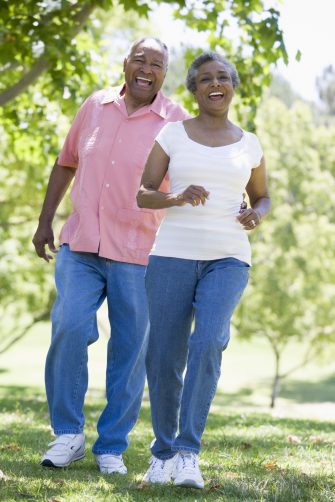Walking Pace Matters!
 Walking is an excellent, low-impact, form of physical activity and is known to have multiple health benefits. In fact, it can even help you live longer. But, does the speed that you walk matter in how much walking benefits your health?
Walking is an excellent, low-impact, form of physical activity and is known to have multiple health benefits. In fact, it can even help you live longer. But, does the speed that you walk matter in how much walking benefits your health?
A study published in Medicine & Science in Sports & Exercise® followed over 300,000 individuals aged 40-69 for almost eight years. Individuals participating in the study were followed for an average of 5 years, with the actual range being 3.3 to 7.8 years.
Participants reported walking pace and total walking time to researchers. For the purpose of the study, mortality was recorded as all-cause mortality to include any cause of death, as well as incidence and mortality from CVD, respiratory disease and cancer. Over the course of the study, 5,890 participants died, 18,568 developed CVD, 5,430 were diagnosed with respiratory disease and 19,234 with cancer.
When the data was analyzed, brisk pace walkers had a lower mortality risk from all-causes, respiratory disease and chronic obstructive pulmonary disease. There was no connection found for all-cause cancer, colorectal, and breast cancer. In contrast, slower walkers had a lower risk of prostate cancer.
These results show that there are health benefits to walking regardless of the speed – however, picking up the pace can help combat respiratory disease and chronic obstructive pulmonary disease more than walking at a slower pace.
Depending on a walker’s fitness level, the actual speed may vary; but walking researcher Professor Emmanuel Stamatakis from the University of Sydney’s Charles Perkins Centre and School of Public Health describes a brisk pace as walking at a pace that makes you slightly out of breath or sweaty when sustained.
In another study, published in June 2018 in the British Journal of Sports Medicine, the researchers sought to determine the associations between walking pace with all-cause, cardiovascular disease and cancer mortality.
They found that walking at an average pace led to a 20 percent risk reduction for all-cause mortality compared with slow paced walking, while walking at a brisk or fast pace was linked to a 24 percent risk reduction. Similarly, the risk of cardiovascular disease mortality went down 24 percent for those walking at an average pace and 21 percent for those walking at a faster pace, compared to slow paced walking.
The protective benefits linked to walking pace were seen to be more pronounced for older individuals. Walkers aged 60 years or over who kept an average pace experienced a 46 percent reduction in risk of death from cardiovascular causes, and that increased to 53 percent reduction for those walking at a fast pace.
The data suggests that no matter how much time you walk, a faster pace could add years to your life! So even if you don’t have much time to devote to your exercise, lace up your walking shoes and get moving – and reap the benefits!
If you have a medical history or risk factors for chronic diseases like these, talk to your doctor about how a walking program could benefit your health and help keep you active.
REFERENCE:
Celis-Morales CA, Gray S, Petermann F, Iliodromiti S, Welsh P, Lyall DM, Anderson J, Pellicori P, Mackay DF, Pell JP, Sattar N, Gill JMR. Walking Pace Is Associated with Lower Risk of All-Cause and Cause-Specific Mortality. Med Sci Sports Exerc. 2019 Mar;51(3):472-480. doi: 10.1249/MSS.0000000000001795.
Stamatakis E, Kelly P, Strain T, Murtagh EM, Ding D, Murphy MH. Self-rated walking pace and all-cause, cardiovascular disease and cancer mortality: individual participant pooled analysis of 50 225 walkers from 11 population British cohorts.British Journal of Sports Medicine, 2018; 52 (12): 761 DOI: 10.1136/bjsports-2017-098677